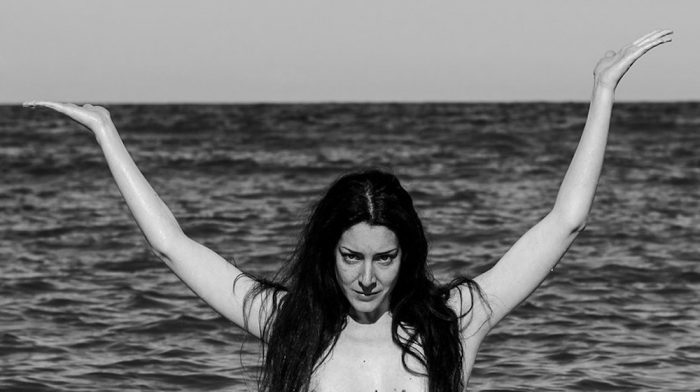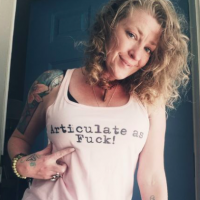Our most humane needs are to create, to nurture, and to love.
Cascades of emotions flood me, too many for an ordinary day. I practically feel pregnant, instead of my daughter.
This tender innocent, and my responsibility to her, is restructuring my world. Something is opening—a portal of initiation.
I am becoming a grandmother.
I am fiercely loving; it is ingrained in my nature. Spiraled protection spells are etched into my bones. What is the best spell for protection? Why honesty, of course.
Not long ago, on an inward journey, I experienced everything I identify with falling away. Once everything had been peeled from my psyche, two things remained of my identity: motherhood and writing. To me, both are the essence of my vocation: communication. To communicate with clarity and compassion is my personal dharma and my business’s mission.
Whole worlds are birthed when we communicate well. What is motherhood other than the earnest attempt to communicate our love, skills, values, and—more than occasionally—our worries and neuroses to our offspring? What is nurturing but the activity of communicating care, concern, and importance to those we love?
Writing is much the same. I write with an earnest attempt to communicate about what is hard, holy, and human—what deeply matters to me and is hopefully of benefit to the world. I believe in facing life, the highs and lows, with courage and compassion, and telling our stories with honesty, heart, and humor.
Some things just don’t go as planned. Babies come when they will, but inspiration can sometimes be courted. As much as with our creativity—as with our emotional well-being—feelings need to be acknowledged to move forward. For us to heal, we must feel, we must communicate with, and about, what is within and around us.
Often when I write, I feel like a fumbling doula, a past-due pregnant woman, and a reluctant baby all at once. All these parts want to be heard and held, felt and honored.
My writing mentor says:
“If you can’t write about the room, write about the elephant.” ~ Waylon Lewis
To write about the elephant in the room, right now, is to write about my daughter’s pregnant belly. To feel the thing that is my current creative clog—also known as writer’s block—is to feel the twist present in my own abdomen. Joy, yes, anticipation, of course—curiosity, wonder, awe, and fear. I am afraid.
Every mother knows this fear. It is the fear my mother felt as I went into labor. It is the fear I felt when I birthed my daughter into the world. It is something else as well—this twist of resistance and agitation—it is my fear that my many mistakes will somehow become the sum of my daughter’s foray into motherhood.
I trust her—my daughter. I trust her body. I trust her instincts. I trust the mysterious path of motherhood, the way we open and become a living gateway between the worlds.
I’m steeped in trust over here. So what don’t I trust? I don’t trust myself. I don’t trust that I’ve done enough. I don’t trust that I instilled a deep enough sense of security when she was young and at her most vulnerable and impressionable. It’s a powerful juxtaposition—the tension between this fear and this trust.
The snow is drifting down, soft and thick. Just 24 hours ago, it was 50 degrees and windy. The sun shone brightly for Brigid’s Day, then dropped suddenly into what we really need: more snow to soften the ground and melt water into the streams, and lakes to nurture the flora and fauna and keep the inevitable summer fires at bay.
As much as I fear my daughter will recreate my mistakes, I trust that she is also the one to break free from a long pattern of maternal toxicity in my family.
Are we women, who once shared a womb, poison? Don’t be absurd. We are wholesome witches in the sense that we know our way, naturally.
My granddaughter is of this lineage; she is the culmination of the knowledge and care from we who have come before her, hacking back the overgrowth and adaptations that bound us to addiction and codependency. We—my mother, my daughter, and I—have worked hard to prepare the soil for her, my granddaughter, and she will flourish.
It seems only yesterday I was singing “You Are My Sunshine” to my daughter. Maybe I will sing it to her tonight as I rub lavender oil into her laboring bones, her muscles stretched to capacity for the potent life she holds.
We will laugh this little girl into existence, for anything that’s important must be borne with laughter, lest we lose our way.
It’s not just that I’m afraid my own mistakes will become my daughter’s—as my blonde hair, blue eyes, and statuesque height have—it’s that she’s still too young, in my mind, to be making a baby, even though the evidence blooms in her hips and her seeded womb, as surely as it does in her cheeks. She glows, as pregnant women—beholden to the miracle of their own bodies—often do.
She is loved, treasured, and revered—not perfectly, but humanly, messily. There will be many messes to be made that I can’t clean up, and many I’ll be able to help with, too.
Imbolc is the pagan’s name for the celebration of new life, and it falls in the first days of February. Of course my granddaughter would make her way into the world in this window.
The crone’s wisdom calls me, though I’m not yet 40. My cheeks flush with heated innocence still, my laughter trills, my wisdom deepens with acceptance. There is great love here.
Women’s wisdom wakes in my blood, the blood that moves me beyond my mind, beyond control, beyond agenda. Blood that calls for surrender, that drips from between maiden’s legs and stains the birthing bed, blood that still flows from me, with the pull of the moon, bubbles with remembering.
My blood will rise and wonder will fill me, when I look into my granddaughter’s eyes. She’ll need a wise one, a wild one, a woman of soul and conviction. She’ll need a woman who won’t tame her; who will walk barefoot on the body of the earth with her; who will spin her ’round, messing her twig-bedecked tresses, and kiss her scraped, dirty knees. She’ll need a woman to wake her at sunrise for breakfast picnics, and bid her drink in the starlight long past her bedtime, and tell her tales of power and tenderness.
We need women wild, wholesome, and holy. That’s what grandmothers are made for.











Read 9 comments and reply